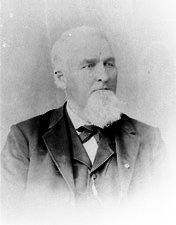Alonzo J. Edgerton
This article needs additional citations for verification. (December 2008) |
Alonzo J. Edgerton | |
|---|---|
 | |
| Judge of the United States District Court for the District of South Dakota | |
| In office January 16, 1890 – August 9, 1896 | |
| Appointed by | Benjamin Harrison |
| Preceded by | new seat |
| Succeeded by | John Emmett Carland |
| United States Senator from Minnesota | |
| In office March 12, 1881 – November 14, 1881 | |
| Preceded by | William Windom |
| Succeeded by | William Windom |
| Member of the Minnesota Senate | |
| In office 1859 1876 | |
| Personal details | |
| Born | Alonzo Jay Edgerton June 7, 1827 Rome, New York |
| Died | August 9, 1896 (aged 69) Sioux Falls, South Dakota |
| Political party | Republican |
| Alma mater | Wesleyan University |
| Military service | |
| Allegiance | United States of America Union |
| Branch/service | United States Army Union Army |
| Years of service | 1862–1867 |
| Rank | |
| Unit | 10th Minnesota Infantry Regiment 67th U.S. Colored Infantry Regiment |
| Battles/wars | American Civil War |
Alonzo Jay Edgerton (June 7, 1827 – August 9, 1896) was an American politician, a United States federal judge and an officer in the Union Army during the American Civil War.
Biography
Alonzo Edgerton was born in Rome, New York. Edgerton graduated from Wesleyan University in 1850, and there became a member of the Mystical Seven. He read law in 1855. After residing in Mississippi and Illinois for periods of time, Edgerton settled in Mantorville in 1855 and was admitted to the bar.[1] In 1859 he was elected to the Minnesota State Senate.[2] In 1862 Edgerton organized a company of militia which later constituted Company B of the Tenth Minnesota Infantry Volunteers. By January 1864 he had risen to the rank of Colonel of the 67th Regiment Infantry U.S. Colored Troops. He was brevetted a Brigadier General on March 13, 1865 and confirmed on April 10, 1866.[1]
Returning to Minnesota, he was in private practice of law in Mantorville, Minnesota from 1867 to 1871. Edgerton became a regent of the University of Minnesota and was in 1872 was appointed as the first state railroad commissioner. After his term ended in 1876 Edgerton returned to the state senate. He was appointed U.S. Senator from Minnesota as a Republican, and served from March 12, 1881 to November 14, 1881 in the 47th congress. Edgerton was a replacement for Senator William Windom, who became Secretary of the Treasury under President James A. Garfield; Windom left the cabinet after Garfield's brief presidency and then was re-elected to serve out the remainder of his own term. Edgerton was later appointed chief justice of the Territorial Supreme Court of Dakota.
When South Dakota was admitted as a State into the Union, he was made United States judge of that district. He also served as president of the constitutional convention of South Dakota.[3] He was a freemason.[3] He died in Sioux Falls, South Dakota.
Legacy
The town of Edgerton, Minnesota is named in his honor.[4][5]
See also
References
- ^ a b Early Settlers of Edgerton webpage
- ^ Alonzo Jay Edgerton, Minnesota Legislators Past and Present
- ^ a b Jon K. Lauck, 'The Foundations of Political Culture in East River South Dakota', in The Plains Political Tradition: Essays on South Dakota Political Culture (eds. Jon K. Lauck, John E. Miller, Donald C. Simmons, Jr.), Pierre, South Dakota: South Dakota State Historical Society Press, 2011, p. 28
- ^ Early Settlers of Edgerton, Minnesota
- ^ Upham, Warren (1920). Minnesota Geographic Names: Their Origin and Historic Significance. Minnesota Historical Society. p. 417.
- Alonzo Jay Edgerton at the Biographical Directory of Federal Judges, a publication of the Federal Judicial Center.
External links
- United States Congress. "Alonzo J. Edgerton (id: E000046)". Biographical Directory of the United States Congress.
- 1827 births
- 1896 deaths
- People from Rome, New York
- People of Minnesota in the American Civil War
- Wesleyan University alumni
- Union Army colonels
- Minnesota State Senators
- United States Senators from Minnesota
- Minnesota Republicans
- Politicians from Sioux Falls, South Dakota
- Judges of the United States District Court for the District of South Dakota
- United States federal judges appointed by Benjamin Harrison
- 19th-century American judges
- Dakota Territory Supreme Court justices
- Republican Party United States Senators
- South Dakota Republicans
- United States federal judges admitted to the practice of law by reading law
- People from Mantorville, Minnesota
